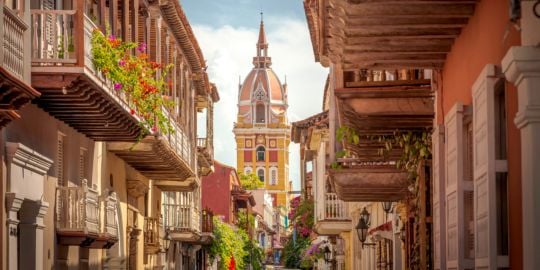I Speak Colombian
The first expression that most foreign people in Colombia will learn is, “Estás amañado en Colombia?” This is a general question that basically is asking you, “Are you getting acclimatized to Colombia?” Sensible responses to this question would be, “Of course, I love the fact that I don't have to tip any of the waiters in this country and also I can buy $400 pesos ($0.20USD) worth of deodorant in a small envelope at any corner store if I am running low on cash.”
Spanish in Colombia is pretty easy to pick up, due to the fact that every Colombian who sees you wants to talk to you. Colombian people are naturally drawn to foreign people. In some cases they treat the foreigner as if they were the smartest most trustworthy people they have met. So much goodwill can be downright unnerving sometimes.
Probably the best thing about speaking Spanish in Colombia is that you don't have to really learn the names of any Colombian men. Instead, you can just refer to any man you have met on the street as maestro. In English, maestro is reserved for an artist who has their work displayed in many different museums around the globe or for someone who has been paid to conduct a symphony. Here in Colombia, you can call someone a maestro just because you like the quality of chips he is selling out of a shopping cart near the mini stop.
An everyday phrase here in Colombia is, “Hay un inconveniente.” In English, this phrase would be used if maybe the meal you ordered at a restaurant is going to take 5 or 10 minutes longer than expected to arrive to your table. The waiter would tell you, “Sorry sir, there is an inconvenience, the pork sandwich you ordered is going to take an extra 10 minutes before it will be ready.”
Good luck if you are in a hospital in Colombia and the doctor tells you, “Hay un inconveniente.” This no doubt means that what they thought was just a little routine acid reflux really means that your kidneys have exploded and you have 3 minutes to live.
Another oddity in Colombia is the fact that the customer is made to feel almost like royalty. This example is illustrated when you enter the small corner grocery store and the sales clerk says to you, “A sus órdenes su merced” (At your service, your mercy).
You thank the clerk for such a warm welcome and try to explain to her that really you aren't anyone important. You actually just came in to buy $1,500 pesos ($0.75USD) worth of that good Bocatto ice cream and are not worthy of being called “Your mercy.” To this, the clerk will promptly respond, “Para servirle” (another common way to say ‘at your service').
Even the older gentleman, with the fleet of dogs by the bus station is always asking “Me colabora?” (Would you like to collaborate with me?) Like we should get together and work on a project, just him and me. When I inform him that I really already have enough business partners in place and he should use the capital he was going to invest in my company to maybe buy some more food for his dogs. He then looks at me like I am the crazy one.
At home, I always hear my girlfriend say these bizarre expressions over the phone like, “Mommy, make sure to put all your books in your backpack for school tomorrow,” or “Mommy, make sure not to spend all your money on candy, save it for your lunch.”
I would then ask my girlfriend two questions, #1) I didn't realize your 53-year old mother was still in school and #2) Isn't it a little out of the ordinary to lecture your own 53-year old mother on how she should be spending her money?
“When I say Mommy, I am referring to my daughter, not my actual mother.”
“Oh ok, that's clear,” I would reply.
Another strange occasion involving my girlfriend's daughter arose when she showed me a text message she sent to her daughter, “Mommy, don't let the other girls ride you in school.” (Mommy, no dejes que te la montan en la escuela).
“Ok, I understand the mommy part now, that's clear. I am a little confused about your daughter being ridden around like livestock while at school. I thought she was going to private school.”
“No, te la montan is referring to when the other girls pick on my daughter at school.”
Many people complain about riding the buses here in Bogota. They say that the drivers are crazy and the people who ride the bus all smell like ham. Trying my best to keep an open mind, and mostly failing at it, I always try to control my anger towards the driver, who seems to speed up every time he is approaching a red light. One day, I heard the voice of a woman who had just gotten out of her seat and was walking towards me on her way to the back exit of the bus, “Qué pena con usted.” (What a disgrace with you). Wow, this woman must have really done something bad. The situation then righted itself as ...
Please view/share the book "48,000,000 Colombians Can't Be Wrong," by Brian Ward on Amazon.
#colombia #bogota #venezuela #90dayfiance #falcao #medellin #mexico #argentina #colombiancupid #cali #nationalgeographic #garciamarquez #culture #travel #colombian #amazon #caracas #botero #envigado #colombiatravel #panama #elpibe #vamoscolombia #cartagena #brasil #gabriel garcia marquez #travelwriting #vergara #elgabo #barranquilla #valderrama #shakira #oprah #hurricane #cancun #learnspanish #southamerica #sofiavergara #workabroad #gofundme @48million #tarantino #rcn #caracol #mountmonserrate
I Speak Colombian
The first expression that most foreign people in Colombia will learn is, “Estás amañado en Colombia?” This is a general question that basically is asking you, “Are you getting acclimatized to Colombia?” Sensible responses to this question would be, “Of course, I love the fact that I don't have to tip any of the waiters in this country and also I can buy $400 pesos ($0.20USD) worth of deodorant in a small envelope at any corner store if I am running low on cash.”
Spanish in Colombia is pretty easy to pick up, due to the fact that every Colombian who sees you wants to talk to you. Colombian people are naturally drawn to foreign people. In some cases they treat the foreigner as if they were the smartest most trustworthy people they have met. So much goodwill can be downright unnerving sometimes.
Probably the best thing about speaking Spanish in Colombia is that you don't have to really learn the names of any Colombian men. Instead, you can just refer to any man you have met on the street as maestro. In English, maestro is reserved for an artist who has their work displayed in many different museums around the globe or for someone who has been paid to conduct a symphony. Here in Colombia, you can call someone a maestro just because you like the quality of chips he is selling out of a shopping cart near the mini stop.
An everyday phrase here in Colombia is, “Hay un inconveniente.” In English, this phrase would be used if maybe the meal you ordered at a restaurant is going to take 5 or 10 minutes longer than expected to arrive to your table. The waiter would tell you, “Sorry sir, there is an inconvenience, the pork sandwich you ordered is going to take an extra 10 minutes before it will be ready.”
Good luck if you are in a hospital in Colombia and the doctor tells you, “Hay un inconveniente.” This no doubt means that what they thought was just a little routine acid reflux really means that your kidneys have exploded and you have 3 minutes to live.
Another oddity in Colombia is the fact that the customer is made to feel almost like royalty. This example is illustrated when you enter the small corner grocery store and the sales clerk says to you, “A sus órdenes su merced” (At your service, your mercy).
You thank the clerk for such a warm welcome and try to explain to her that really you aren't anyone important. You actually just came in to buy $1,500 pesos ($0.75USD) worth of that good Bocatto ice cream and are not worthy of being called “Your mercy.” To this, the clerk will promptly respond, “Para servirle” (another common way to say ‘at your service').
Even the older gentleman, with the fleet of dogs by the bus station is always asking...
Please view/share the book "48,000,000 Colombians Can't Be Wrong," by Brian Ward on Amazon.
#colombia #bogota #venezuela #90dayfiance
Colombian Spanish
This excerpt was hilarious.
Reminds me of the British-Expat columnist for the Sunday papers in Bangkok whose columns I read faithfully on my visits to Thailand.
Any visitor to Colombia realizes, however, that the most common question to visiting Expats is not 'Are you getting accustomed to Colombia?' No, it's actually the same dull question you learned on your first day of Spanish 1 in high school: ¿Cómo está usted?
The 'mamá' paragraphs cracked me up.  Cute stuff.
Cute stuff.
In fact, the above was the most fascinating post I've read on this forum since the last time Osage Archer explained the 'inside baseball' of Expat tax deductions for worldwide income. 
I haven't personally encountered sales personnel acting so subservient as mentioned above. The phrase I have heard the most when passing sales booths is 'A la orden' -- at your service -- though more in Ecuador than in Colombia.
It's true you can get by famously with any 'fulano' (what's-his-name) on the street by calling him 'maestro' (mah-ESS-troh) .. or something less formal -- 'jóven' (young man), 'jovencita' (young woman), 'caballero' (gentleman or sir), 'amigo' (friend), 'vaquero' (cowboy) or 'parce' (buddy).
Gracias, Maestro. 
cccmedia
They calll persons(men) they dont know welll "caballero" . Really intimate friends or family "marica" , enemies "malparido hp guevon ( or huevon).
When the. call you "patron" you know they are trying to sell you something or get something off of you.
huevón = lazy, slacker, loafer, idiot, or moron
marica = homo(sexual)
-- source: wordreference.com
Quechimba wrote:They call persons (men) they don't know well "caballero."
Male Expats will frequently hear the term caballero (originally derived from a word for knight or horseman and still used in some contexts as such) at higher-end places. These could be upscale hotels, clubs and restaurants. Its most common English translation in such venues is 'gentleman' or 'sir'.
Wordreference.com also translates caballero as 'man of honor'.
cccmedia
Nahh..I get it from shop owners and bums in the street trying to sell me stuff
My two cents...
Latin American Spanish and for that matter, the Colombian lingo has many local expressions (slang) which are sometimes not understood in other Latin American countries. Also, depending on the region of Colombia and the "estrato" you find yourself in, these might even differ somewhat. "Su merced" for instance, is used to mean "You" in a very polite way, hence, "a sus ordenes su merced" is simply a polite way of saying "how can I help you". You can't really translate these expressions literally or the whole meaning will be completely lost. I think the "estas amañado en Colombia" simply means "are you liking it here" and "mommy" or mamy as it is actually spelled, is just another way of saying "honney". I often use mamita when I talk to my 30 yr old daughter. Not to be confused with "mamasita" which is often used to refer to a good looking girl  .
.
Ah, and one more note here. I often travel to Brazil where Portuguese is spoken, and I have come to find out that some of the words I thought were original from Colombia aren't really... "Bacano" meaning good, "Legal" meaning nice and of course, "Parceiro" meaning socio. These words are commonly used in Brazil, and mean exactly the same as they mean in Colombia. Who copied whom? BTW, these three words are not spoken or even understood in any other Latin American country I have been to.
Several useful and interesting links which explore some of the words and phrases, and dichos y refranes, used in Colombia:
https://lexicografiaunisalle.wordpress.com/https://www.colombiamagica.co/entreteni … e-colombia









